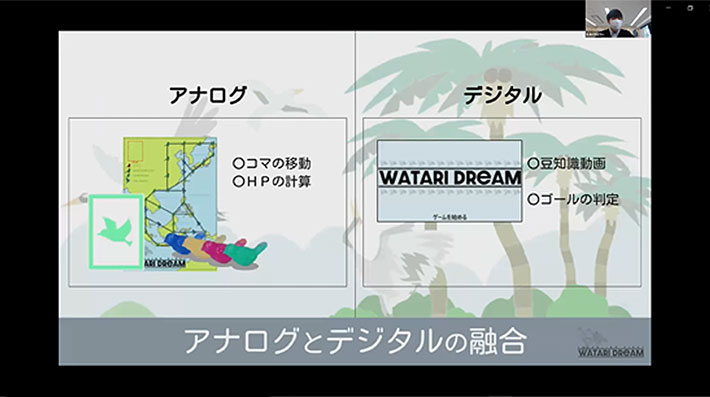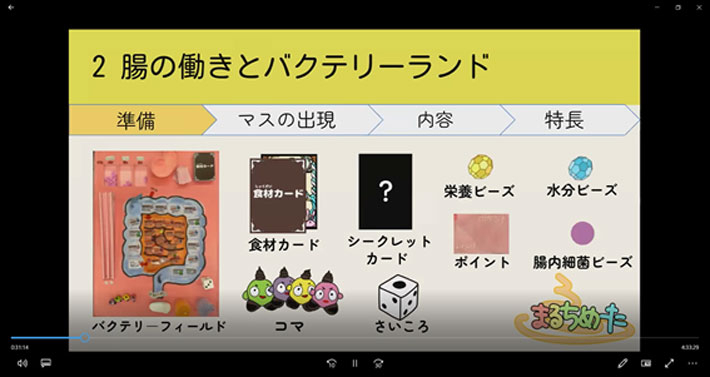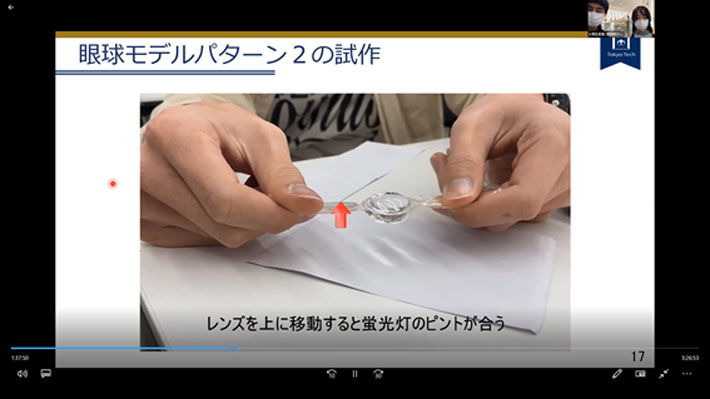Tokyo Tech's School of Life Science and Technology hosted the 14th BioCon, or bio-creativity contest for high school students, and the 15th Bio-Creativity Design Contest 2022 online on January 22.
The BioCon is a competition where high schoolers from around Japan develop learning materials regarding life and the natural world for elementary and middle school students. Each team is supported by teaching assistants from Tokyo Tech. The Bio-Creativity Design Contest is the culmination of the Advanced Bio-Creative Design course for 2nd- and 3rd-year Tokyo Tech students. Heavily focused on group work, this course encourages students to develop and design a bio-related creation that addresses some current societal issue.
These two contests have been held jointly since 2020. After the high school and university teams present their creations, judges first evaluate the BioCon participants. After this, the judges evaluate both the university teams and the best high school teams joining the Bio-Creativity Design Contest.
This year, eleven teams from eight high schools and four teams from Tokyo Tech participated.
Teams and presentations
Each of the following teams gave a 12-minute presentation which included a short Q&A session. When presenting their teaching materials, many teams gave particular attention to the fact that participating elementary and middle school students were online and could not physically access any of the materials.
-
Team Fossil, Seishin Gakuen High School
Coelacanth love
-
Multimeter, Sagamihara Secondary School
Improving the intestinal environment and health
-
Ichi Fukujin, School of Life Science and Technology, Tokyo Tech
Musical instrument to experience brain activity
-
Teeth!, Toin Gakuen
The structure of teeth in familiar animals
-
Passione, Atsugi Senior High School
The Pepsi fighters
-
Inverted reality, School of Life Science and Technology, Tokyo Tech
Make things visible: From the optical perspective of visual organs
-
"Fun"gus girls, Seisen Senior High School
The Lego battle of the bacterial human body
-
Migratory, Sagamihara Secondary School
Traveling birds: Watari dream
-
punny, Seishin Gakuen High School
Let's protect the earth! Planetary boundaries
-
Deadly psocid extermination capturer, School of Life Science and Technology, Tokyo Tech
Psocids
-
Neutralization, Azabu University High School
Learning the world of pH from everyday things
-
Shinjuku cancer prevention project, Tokyo Metropolitan Shinjuku High School
The form of cancer — Things you didn’t know
-
Homo gakugeis, Tokyo Gakugei University Senior High School
Models of genes and breeding
-
Team rocket, Azabu University High School
Vegetable rocket: Feeling enzymes with our eyes
-
Haruto Suzuki, School of Life Science and Technology, Tokyo Tech
Water pollution
Poster session
While viewing the posters created by the teams, the participants, judges, and presenters were all able to interact during the online poster session. This gave participants a chance to address further questions that could not be answered during the presentations, and provided judges and Tokyo Tech faculty members to offer further comments and advice.
Bio-play session
After the presentations, approximately 20 young students, mostly from elementary school, were invited to test out the groups' creations during the traditional bio-play session. Despite the online environment, the youngsters were able to experience the bioscience and biotechnology creations while talking with the group members.
Evaluation and competition results
This year, two Tokyo Tech faculty members and six evaluators from outside the Institute selected winners and runners-up in the competitions. Students, faculty members, and bio-play session participants cast their votes to determine the winners of the Audience Award and Poster Presentation Awards.
BioCon results
-
Winner:
Migratory, Sagamihara Secondary School
-
2nd place:
Multimeter, Sagamihara Secondary School
punny, Seishin Gakuen High School
-
Yokohama City Board of Education Award:
Team rocket, Azabu University High School
-
Judges' Award:
Shinjuku cancer prevention project, Tokyo Metropolitan Shinjuku High School
Homo gakugeis, Tokyo Gakugei University Senior High School
-
High School Poster Presentation Award:
Team Fossil, Seishin Gakuen High School
-
Audience Award:
Migratory, Sagamihara Secondary School

Presentation by Team Migratory

Presentation by Team Multimeter
This year, Team Migratory from Sagamihara Secondary School was selected as both the recipient of the Audience Award and the overall winner of the BioCon contest. Their work on migratory birds were praised as high-quality teaching materials that incorporated both analog and digital techniques.
Bio-Creativity Design Contest results
-
Winner:
Inverted reality
-
Judges' Award:
Inverted reality
-
Experiment Award:
Ichi Fukujin
-
University Poster Presentation Award:
Deadly psocid extermination capturer

Presentation by Team Inverted reality
After the contests had finished, the members of all the teams freely exchanged opinions with the judges, faculty members, and other students.
For the second year running, both the BioCon and Bio-Creative Design Contest were held fully online. Despite the additional challenges of creating for and working in an online environment, these team-focused challenges again resulted in exciting, informative teaching materials that show great potential for further use in the future.
. Any information published on this site will be valid in relation to Science Tokyo.







